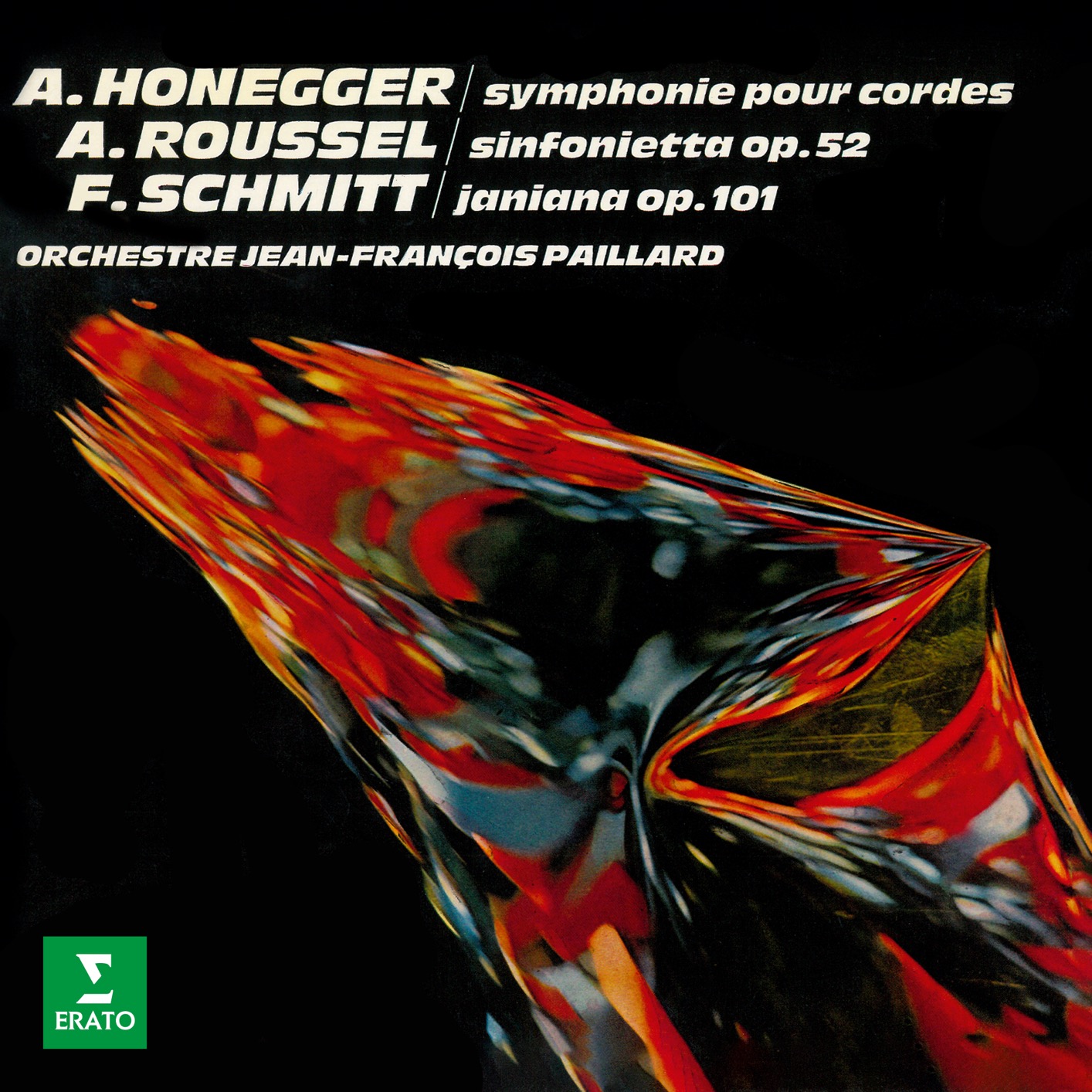
Jean-François Paillard – Honegger – Symphonie No. 2 pour cordes (1966/2020)
FLAC (tracks) 24 bit/192 kHz | Time – 50:03 minutes | 1,8 GB | Genre: Classical
Studio Masters, Official Digital Download | Front Cover | © Warner Classics
Honegger: The Symphony No. 2 for strings and trumpet by Arthur Honegger was commissioned in 1937 by Paul Sacher to mark the tenth anniversary of the chamber orchestra Basler Kammerorchester. Progress was slow, however, in part due to the interruption of the Second World War. The music is primarily for strings alone and is very turbulent and troubled until the trumpet soloist enters near the end of the music, giving this mostly tragic work a hopeful ending.
Roussel: For his sixtieth birthday in 1929, there was a festival in Paris of three concerts devoted to his music. One of the concerts included of a collection of commissioned piano pieces, Homage à Albert Roussel, written by several prominent composers, including Jacques Ibert, Francis Poulenc and Arthur Honegger. He considered this a singular honor and listed it as a highpoint of his career. Roussel never attained the acclaim and lasting popularity of some of his contemporaries, but he was an important composer, with an international reputation. A good deal of his music continues to be performed and enjoyed, never having left the repertoire.
Schmitt: The Janiana Symphony was composed in 1941 at Schmitt’s summer home in Artiguemy, high in the Pyrenees Mountains. As alluded to in its title, the symphony was dedicated to Jane Evrard, France’s first female professional orchestral conductor, and her Orchestre féminin de Paris. This was an ensemble of 25 women musicians Maestra Evrard founded in 1930, and for which other French composers such as Albert Roussel, Jean Rivier and Jean-Yves Daniel-Lesur also wrote scores.
Conductor and musicologist Jean-François Paillard was one of the most visible French exponents of Baroque music from the 1960s onward. Paillard earned a degree in mathematics from the Sorbonne, but he turned to music soon after. He attended the Paris Conservatory as a musicology student, where he won first prize in music history; he later studied conducting at the Salzburg Mozarteum with Igor Markevitch. He formed the Ensemble Jean-Marie Leclair in 1952, which was renamed the Jean-François Paillard Chamber Orchestra the following year. Comprised of a dozen string players and a harpsichord, the group paralleled such small-scale English ensembles as the Boyd Neel Orchestra in performing Baroque-era works – especially those from France – as well as contemporary works for string orchestra. As the public’s interest in Baroque music rose, the orchestra’s popularity grew and was aided by a series of international tours covering dozens of countries. The group’s recordings on Erato – which included the standard Baroque repertory such as Bach’s Brandenburg Concertos and the Orchestral Suites, as well as pieces by Couperin and Rameau – were initially easier to find in Europe. But when RCA Victor picked up the Erato catalog for U.S. distribution in the 1970s, Paillard’s records were snapped up by American listeners. Lightning struck for Paillard late in the decade with his recording of the Canon in D by Johann Pachelbel. Paillard’s ran nearly twice as long as most rival recordings, by virtue of its uniquely slow tempo and its finely delineated parts for the strings, both bowed and pizzicato. Paillard further benefited when Victor issued it on a full-priced LP and paired it with Fasch’s Trumpet Concerto and grouped with various RCA artists on a budget-priced compilation LP called Go for Baroque. Sales of Go for Baroque moved faster than Beatles’ albums were sold. Paillard’s performances and recordings have also included works by Roussel and Debussy. He has worked with such celebrated soloists as Maurice André and Jean-Pierre Rampal. Paillard has won numerous Grand Prix du Disque awards in France and Prix Edison awards in Holland and his release of Rameau’s Les Indes galantes remains a highly regarded recording. Later in his career, Paillard turned more to guest conducting orchestras around the world and his avid interest in the sciences.
Tracklist
1. Jean-François Paillard – Symphony No. 2 in D Major: I. Molto moderato
2. Jean-François Paillard – Symphony No. 2 in D Major: II. Adagio mesto
3. Jean-François Paillard – Symphony No. 2 in D Major: III. Vivace, non troppo
4. Jean-François Paillard – Sinfonietta, Op. 52: I. Allegro molto
5. Jean-François Paillard – Sinfonietta, Op. 52: II. Andante
6. Jean-François Paillard – Sinfonietta, Op. 52: III. Allegro
7. Jean-François Paillard – Janiana, Op. 101: I. Assez animé
8. Jean-François Paillard – Janiana, Op. 101: II. Musette d’allure joyeuse
9. Jean-François Paillard – Janiana, Op. 101: III. Chorale. Grave
10. Jean-François Paillard – Janiana, Op. 101: IV. Avec entrain, sans précipitation
Download:
mqs.link_JeanFran0isPaillardH0neggerSymph0nieN0.2p0urc0rdes1966Remastered202024192.part1.rar
mqs.link_JeanFran0isPaillardH0neggerSymph0nieN0.2p0urc0rdes1966Remastered202024192.part2.rar










![Jean-Francois Paillard - Telemann, CPE Bach, Fasch & Fux (1957/2021) [FLAC 24bit/192kHz] Jean-Francois Paillard - Telemann, CPE Bach, Fasch & Fux (1957/2021) [FLAC 24bit/192kHz]](https://getimg.link/images/imgimgimg/uploads/2021/05/7u1E86B.jpg)
![Jean-Francois Paillard - 8 Menuets celebres Mozart, Boccherini, Exaudet… (1961/2020) [FLAC 24bit/96kHz] Jean-Francois Paillard - 8 Menuets celebres Mozart, Boccherini, Exaudet… (1961/2020) [FLAC 24bit/96kHz]](https://getimg.link/images/imgimgimg/uploads/2020/10/NTKa6eI.jpg)
![Jean-Francois Paillard - M. Haydn: Concertos for Trumpet, Horn, Organ & Viola (Remastered) (1965/2020) [FLAC 24bit/192kHz] Jean-Francois Paillard - M. Haydn: Concertos for Trumpet, Horn, Organ & Viola (Remastered) (1965/2020) [FLAC 24bit/192kHz]](https://getimg.link/images/imgimgimg/uploads/2020/07/ie8wBob.jpg)
![Jean-Francois Paillard - Les maitres autrichiens de Mozart (1966/2020) [FLAC 24bit/192kHz] Jean-Francois Paillard - Les maitres autrichiens de Mozart (1966/2020) [FLAC 24bit/192kHz]](https://getimg.link/images/imgimgimg/uploads/2021/05/I9fvlm7.jpg)
![Jean-Francois Paillard - Musique instrumentale francaise du XVIIIe siecle (Remastered) (2019) [FLAC 24bit/96kHz] Jean-Francois Paillard - Musique instrumentale francaise du XVIIIe siecle (Remastered) (2019) [FLAC 24bit/96kHz]](https://getimg.link/images/imgimgimg/uploads/2020/04/hkS9JNb.jpg)
![Orchestre De Chambre & Jean-Francois Paillard - Arcangelo Corelli: Les concerti grossi, Op. 6 (1971/2020) [FLAC 24bit/192kHz] Orchestre De Chambre & Jean-Francois Paillard - Arcangelo Corelli: Les concerti grossi, Op. 6 (1971/2020) [FLAC 24bit/192kHz]](https://getimg.link/images/imgimgimg/uploads/2021/04/MoDn9Pt.jpg)